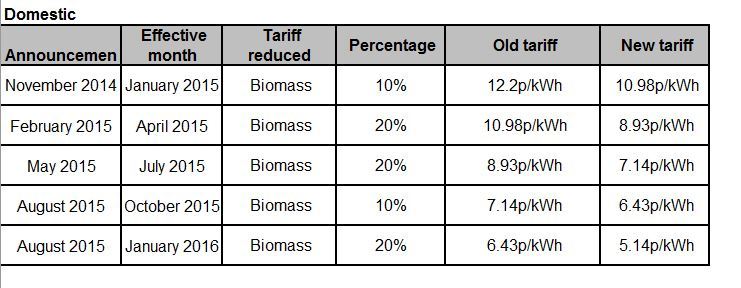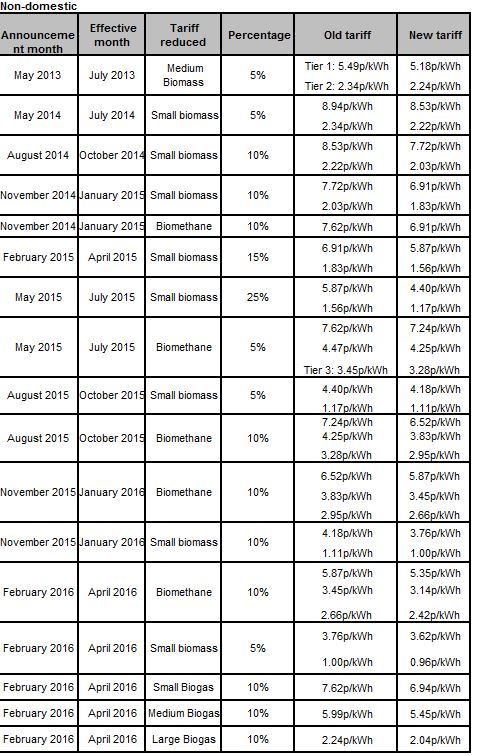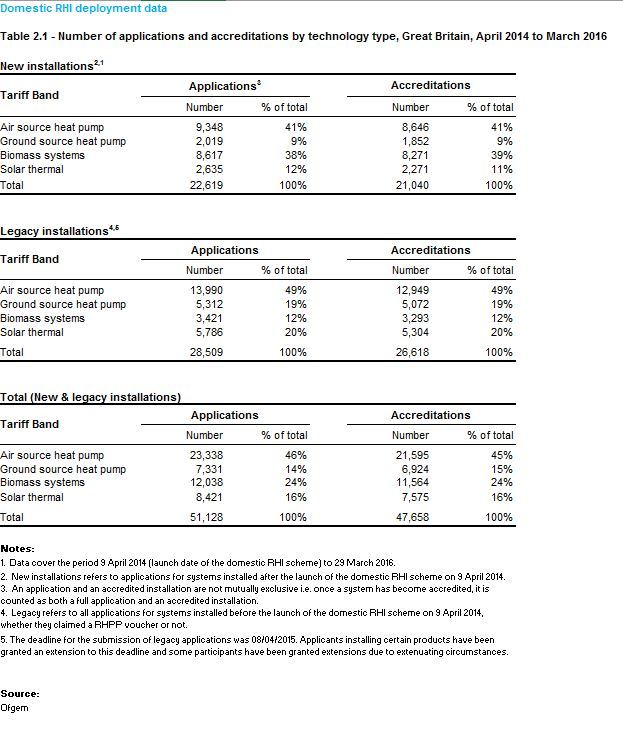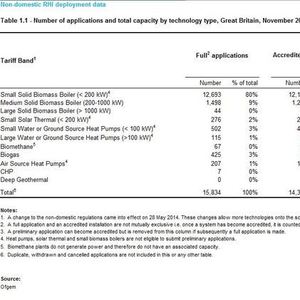DECC releases first quarter 2016 RHI program deployment data













Ofgem
May 2, 2016
BY Katie Fletcher
The U.K. Department of Energy and Climate Change recently published March 2016 monthly statistics and summary of quarter one 2016 deployment data for the renewable heat incentive (RHI) program. In March, there was a large number of biogas applications under the nondomestic RHI scheme, and fewer biomass applications reported in quarter one for the domestic RHI scheme.
As of March 31, a total of 15,834 full applications to join the nondomestic scheme have been received since it launched in November 2011, with a combined capacity of 2.8 GW. Of the applications, 14,307 have been accredited with a combined capacity of 2.4 GW, and 13,497 of these accreditations having received a payment for heat generated under the scheme. In quarter one of 2016, there were a total of 816 full applications to join the nondomestic scheme, 10 percent more than quarter four 2015 and a 51-percent increase over quarter three of 2015.
In March of this year, biogas applications increased to 425 from 147 applications at the end of last year. This was mainly driven by small biogas applications (of which 126 were received in March) and medium biogas applications (of which 96 applications were received in March). According to the DECC, this could be due to the tariff reduction announcement that came into effect as of April 1, which will see biogas tariffs reduced by 10 percent. The reduction in tariff is a means of keeping the scheme within budget over time.
Advertisement
Advertisement
There were also a number of large combined-heat-and-power (CHP) applications in March. At the end of the first quarter this year, there were seven CHP applications on the scheme, up from two at the end of 2015, but these have a combined capacity of 33.5 MW (6.3 MW at the end of last year). None of these CHP applications have been accredited yet, however. In Total, 7,277 GWh of heat has been generated and paid under the nondomestic RHI scheme, 84 percent of which has come from biomass installations and 14 percent from biomethane injected into the grid.
Besides a 10 percent reduction in biogas tariffs this year, there was also a biomass tariff reduction of 20 percent that came into effect Jan. 1, which may have prompted the decrease in biomass applications under the domestic RHI scheme during quarter one. During the first quarter of 2016, 250 domestic biomass applications were received, compared to 645 applications during quarter four of 2015 and 691 during quarter three.
Advertisement
Advertisement
As of March 31, there have been 51,128 unique applications to join the domestic scheme (22,619 from new installations installed since April 9, 2014), of which 47,658 have been accredited. At the end of the first quarter, 45 percent (21,595) of all accreditations were for air source heat pumps, 24 percent (11,564) were biomass boilers, 16 percent (7,575) were for solar thermal and 15 percent (6,924) were ground source heat pumps. Of the 47,658 accreditations, 21,040 were considered new installations—or applicants who had systems installed on or after the domestic RHI scheme launch date of April 9, 2014—and 26,618 were from legacy applications—or systems installed between July 15, 2009 and the launch of the scheme.
Full RHI deployment data for March and quarter one of this year can be downloaded here.
The DECC is also now analyzing public feedback on a consultation of the government’s proposed reforms to the existing domestic and nondomestic RHI schemes, which ran from March 3 to April 27 of this year. The reform consultation document can be accessed here.
Upcoming Events





